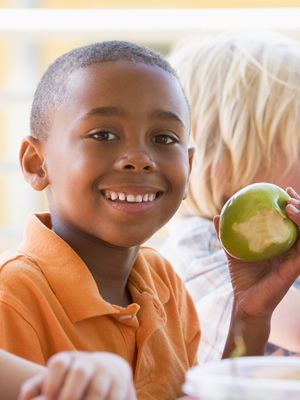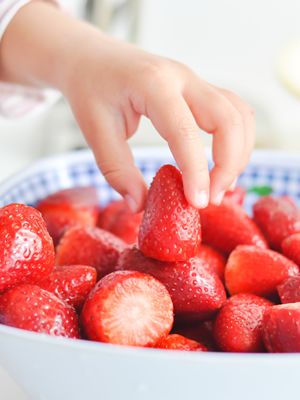- Visit our Location
3203 Mayfair Road
Gwynn Oak, MD 21207 - Give us a Call
(410) 281-7813 - Send us a Message
Email Us
 Our Nutritional Meals & Snacks
Our Nutritional Meals & SnacksResearch shows that establishing healthy eating habits early in life has positive effects on a child’s health and well‐being. The Maryland State Department of Education administers the Child and Adult Care Food Program (CACFP), a nutrition education and reimbursement program for licensed childcare centers. The CACFP helps childcare providers serve nutritious meals, meals whose contents are low fat, low sugar, low sodium and nut less. When a parent chooses not to participate in eating CACFP-approved foods they must follow these guidelines.
Bonding with your newborn baby is very important. Nursing mothers are always welcome to come and nurse their babies throughout the day. Tender Tots has an area set aside for breastfeeding moms to nurse their babies and pump.
FOOD ALLERGIES - If a parent or guardian requests a modified diet for medical reasons, a written prescription from the child’s health practitioner must be provided to us and be up dated every six months. The prescription must specify which food(s) should be deleted from a child’s diet. You may not share any foods with our children. Some of our children suffer from food allergies. Foods that you bring with you into Tender Tots must be stored in the refrigerator. If you want to prepare and share a treat with the children, ask first about guidelines.
FOOD PREFERENCES - If a parent or guardian requests a modified diet for religious and/or cultural reasons, dated instructions for the diet must be signed by the parent or guardian. These instructions must be provided to us and be updated as needed.
The parent or guardian can expect full cooperation from us in the maintenance of a modified diet for a child. Tender Tots will expect consistency in maintenance of the diet on the part of parents and guardians. All food provisions coming from home must follow the diet every day or be revised by the parent or guardian.
To prevent cross contamination of food items and to prevent allergic reactions, all foods must be in labeled, plastic containers with secure lids. The label should identify the food and include the child’s name.

The following food items are considered choking hazards and may not be brought into here from home:
Any of the above items mistakenly brought here will be immediately discarded.
Infant diets are unique to each child. Parents have the option of supplying their baby with food. However, we will supply jarred baby food at our expense for you. You are responsible for providing prepared bottles for your infant daily. Please consider your child’s normal intake as you prepare the bottles. Leftover contents of a bottle will be discarded after two hours. Unused bottles will be returned to the parent at the end of each day. All bottles and lids must be clearly marked with your child’s name. Breast milk must be in labeled bottles with name and date. All breast milk must be used within 24 hours. Frozen breast milk must be used within six months. Please wash and sanitize all bottles thoroughly when you arrive home. Do not add medication or cereals to bottles.
Infant food items must be in unopened jars or in a microwaveable container. Leftovers will be discarded. Unused items will be returned to the parent at the end of the day.
Your baby, at 7 – 9 months, may have a good appetite but will not have many teeth, so finger foods must dissolve easily in his mouth. As he grows into a toddler, you'll be able to give him bite-size pieces of whatever you're eating. The food should be easy to handle but not present a choking hazard. And be sure to choose food that's appropriate for his age. Here's a list of finger food favorites:
No GUM chewing is permitted.
Enjoy these kid friendly cooking links
https://www.tasteofhome.com/collection/easy-recipes-for-kids-to-make-by-themselves/
https://fns-prod.azureedge.net/sites/default/files/tn/cookbook-homes1.pdf